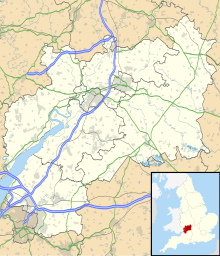| Site of Special Scientific Interest | |
 Soudley Ponds | |
| Location | Gloucestershire |
|---|---|
| Grid reference | SO662112 |
| Coordinates | 51°47′56″N2°29′27″W / 51.79887°N 2.49082°W |
| Interest | Biological |
| Area | 7.04 hectare |
| Notification | 1984 |
| Natural England website | |
Lying close to the village of Soudley in the Forest of Dean, west Gloucestershire, Soudley Ponds (grid reference SO662112 ), also known as Sutton Ponds, comprise four linked man-made ponds lined in succession through the narrow Sutton Valley, and surrounded by stands of tall Douglas Fir. It is a 7.04-hectare (17.4-acre) biological Site of Special Scientific Interest notified in 1984. [1] [2]
Contents
The site is listed in the 'Forest of Dean Local Plan Review' as a Key Wildlife Site (KWS). [3]
